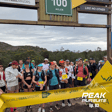
Mindset, Balancing Training and Work, & Kosci 100k Prep feat. Sophie Broome | Episode 84
In this episode of Peak Pursuits, Sophie Broome joins Jess and Brodie to unpack her journey to the upcoming UTK 100.
Sophie reflects on bouncing back from a tough DNF at UTA, the science and testing she’s used to refine her fueling and pacing, and how she’s balancing training with work. Jess shares her own build-up, the challenges of managing anxiety and hormones, and the mental strategies she’s been practicing with a sports psychologist. Together they explore the realities of long-distance trail racing—training dynamics, recovery, mindset, and the importance of arriving fresh and ready to execute on race day.
Keep listening for some trail running news and results from Cost 2 Kosci, Run Bibbulmun Stage Race, Narrowneck Night Run and more!
***Don’t forget, use code PEAK at https://bix-hydration.myshopify.com/en-au for 20% off Bix products, exclusive to PPP listeners!***
Thanks for tuning in to Peak Pursuits!
Connect with us on Instagram @peakpursuits.pod to share your thoughts, questions, and your own trail stories. Until next time, keep hitting the trails and chasing those peak pursuits!
Follow Brodie: Instagram | Strava
Follow Jess: Instagram | Strava
Follow Sophie: Instagram | Strava
Music from #Uppbeat (free for Creators!):https://uppbeat.io/t/mood-maze/trendsetter License code: K08PMQ3RATCE215R



